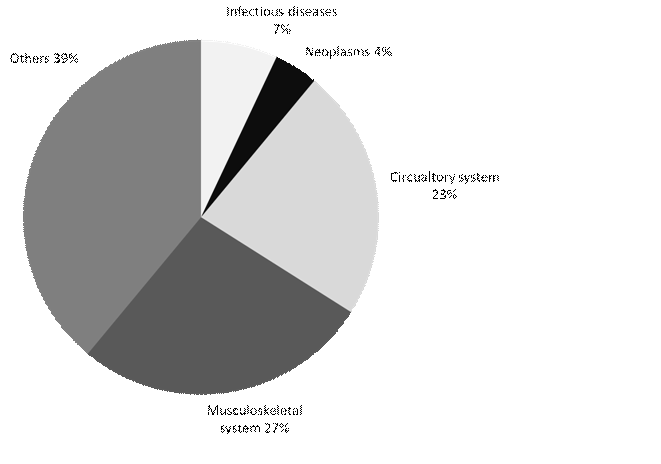Session Information
Date: Monday, November 9, 2015
Session Type: ACR Poster Session B
Session Time: 9:00AM-11:00AM
Background/Purpose: Antibody profiling encompassing rheumatoid factor (RF) and
anti-citrullinated peptide antibodies (ACPA) supports diagnosis in patients
with Rheumatoid arthritis (RA). However, RF and ACPA are not
specific for RA, and predictive values of tests depend heavily on the population in which such tests are
performed. Because testing for these antibodies is frequently ordered by
non-Rheumatologists, at substantial costs, we sought to determine the
predictive values of such testing in patients of a large tertiary hospital.
Methods: Results of all RF and ACPA tests performed in the Vienna General Hospital between 2006 and 2012 were obtained from the Department of
Laboratory Medicine and the ordering departments were determined. Diagnoses were
extracted from the hospital-wide database. Positive and negative predictive
values (PPV and NPV) of RF and ACPA were evaluated.
Results: Between 2006 and 2012 50.138 RF and ACPA tests in 5496 patients
were performed. Among these, 31.2% were positive for RF, 23.5% for ACPA and
21.6% were positive for both antibodies. For 3146 patients (57% of all patients
in whom RF/ACPA was tested) the tests were not ordered by the Department of
Rheumatology. The tests were requested by the Departments of Infectiology
(32%), Angiology (11%), Nephrology (8%), Cardiology (4%), Gastroenterology
(3%), Oncology (3%), Endocrinology (2%), Pneumology (1%), Hematology (1%),
Pediatrics (2%), Ophthalmology (2%), Dermatology (6%), Pediatric Psychiatry
(5%) and the Department of Orthopedics (8%). 2251 of the 3146 patients had a
documented diagnosis. (Figure 1).
Among the 3146 patients 218 (8.8%) were
positive for RF, 118 (3.2%) for ACPA and 56 (2.3%) patients tested positive for
both antibodies. PPV and NPV for the presence of musculoskeletal diseases were
31.7% and 80.9% for RF and 42.4% and 81.5% for ACPA testing. However, for
presence of chronic inflammatory musculoskeletal diseases (ICD-10-Codes M05.X
to M09.X and M30.X to M35.X) PPV were only 16.1% for RF and 30.5% for ACPA. NPV
were 94.7% and 94.4%, respectively.
Conclusion: RF and ACPA testing was frequently ordered by non-Rheumatologists.
In this patient group, we found a relatively high NPV (95%) but a very low PPV
of 16-30%. Thus, >70% of positive tests did not contribute to a diagnosis of
inflammatory musculoskeletal disease. This observation
underscores the necessity to use such testing only in the appropriate clinical
context.
Figure 1: Distribution of the main diagnostic
groups among “Non Rheumatology” patients tested for RF and ACPA (n=2251)
To cite this abstract in AMA style:
Gärtner M, Schneeweiss M, Smolen JS, Machold K. Predictive Utility of Anti- Citrullinated Peptide Antibodies and Rheumatoid Factor – a Retrospective Dataanalysis [abstract]. Arthritis Rheumatol. 2015; 67 (suppl 10). https://acrabstracts.org/abstract/predictive-utility-of-anti-citrullinated-peptide-antibodies-and-rheumatoid-factor-a-retrospective-dataanalysis/. Accessed .« Back to 2015 ACR/ARHP Annual Meeting
ACR Meeting Abstracts - https://acrabstracts.org/abstract/predictive-utility-of-anti-citrullinated-peptide-antibodies-and-rheumatoid-factor-a-retrospective-dataanalysis/

